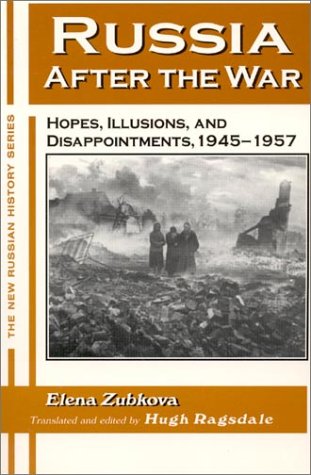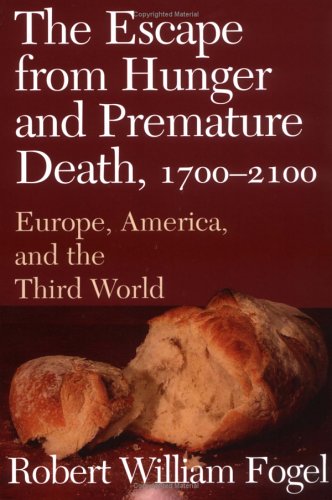Russia After the War: Hopes, Illusions, and Disappointments, 1945-1957 (New Russian History)
By Elena Zubkova
Publisher: M. E. Sharpe
Number Of Pages: 238
Publication Date: 1998-10
ISBN-10 / ASIN: 076560227X
ISBN-13 / EAN: 9780765602275
Binding: Hardcover
Summary: Fine Telling of Rising From the Ashes!
Rating: 5
Elena Zubkova has written a psychological and social profile of Russian society in the twelve years following the end of World War II based on public opinion. As the sub-title aptly suggests, the public mood incased in a barracks mentality hoped for liberalization of government policy, economic reform, the end of food rationing, and perhaps even the abolishment of the collective farm system. Instead, Russian society was met with famine, repression of religion, any hopes of a democratic free market system, and a muffling of literary intellectuals and disappointment. Written chronologically, Zubkova gauges public opinion in its desire for reform from the years immediately following the war until the so-called "Thaw" following the death of Joseph Stalin. The author concludes a constant tug-of-war existed between the government elites, who carefully took into account public opinion and, an insecure society afraid to demand reforms outside the realm of existing socialist policy. The result was a string of what the author refers to as "missed opportunities" (p. 204). The author, who earned her PhD at the Institute of Russian History, utilizes a social history approach sprinkled with psychohistory methodologies. Quantitative statistics and economic analysis also plays a vital role in her research. The bulk of Zubkova's evidence, however, comes from the Central Committee Archive in the form of letters and correspondence voicing the public mood. In addition, memoirs, diaries, literary fiction, and interviews are consulted. The result is a comparatively diverse view reminiscent of Sheila Fitzpatrick's work of the 1920's Russian Peasant (Stalin's Peasants, [1994], See my Amazon review). In the first part of the book, "Strategies of Survival," Zubkova describes the utter devastation of the Russian countryside and the influx of returning war veterans juxtaposed with masses of displaced persons hoping to salvage worn-torn lives and begin a better future. As with the Great War proceeding, the war became the most monumental experience of a whole generation. It created a duality of what the author calls a "spirit of freedom" mixed with an attitude of "us and them" (p. 19). Finding work, adequate housing and food became immediate problems on an enormous scale and quickly replaced illusionary post-war expectations. Part II, "The Illusion of Liberalization" reveals the first appearance of missed opportunities. Zubkova describes how public opinion cried out for the abolishment of the collective farm system and asked why when our people are starving is the government exporting food abroad. Religion, which had been manipulated by the regime for its own purposes, was not gradually being squelched, while intellectuals examined ideas for economic and social reform. Interestingly, one suggestion called for a variance of the free market system only to have the idea deemed subversive towards socialist ideology. The third part, "Repression," captures the descent and resistance between 1947 and 1953. Zubkova demonstrates that immediately following the war, Russian society was still encapsulated within a mindset of sacrifice. They revered Stalin as the hero of the Great Patriotic War and justified his allowing the country to sink into famine as total ignorance to the situation of "he knows what he is doing" attitude. As the author explains, the gulf between the war and peacetime began to widen by 1947. Resistance among the scholarly community and youth groups began to materialize. The regime answered with increased arrests and exiles to GULAG, which the author clearly illustrates with disturbing figures. The final part of the book examines "The Thaw." Stalin's death revealed to the masses that he was all too human and caused panic and uncertainty for the future. Soon, however, a new public consciousness emerged, absorbed in literature and the inclination for an open society. Zubkova argues, this period of euphoria was short-lived, however, as the GULAG system, expressed in the pen of Alexander Solzhenitsyn, revealed the true nature of Stalinism leading to the creation of the "cult of personality" and the duality of Stalin's persona. As Zubkova clearly shows, the war and Stalin evidently left an indelible mark of neuroticism on Russian society. How could the man who led his country to victory over the fascist threat have become the man Khrushchev and others revealed him to be? Zubkova points out, however, as with past generations; the generation of 1945 had historical presidents. This legacy was grounded in hate; an historical emotion that would have to be overcome before the proverbial tug-of-war would end. All-in-all, a fine book, and highly recommended.

HTML, 2.3 MB













